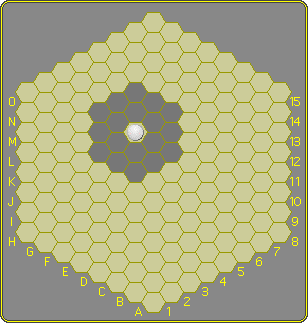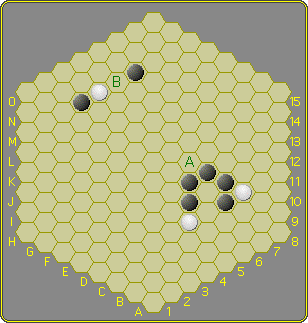Play Hexade interactively
Rules
- The game starts on an empty board. Players move in turn to place one stone on an empty cell. White moves first.
- Between white's first move and his second, there must be at least a two-cell distance. The diagram on the left shows a random first move with the forbidden area for white's second move. Black has no such restriction.


- The game is won by the first player to complete a perfect six, which means creating:
- six stones in a straight row, or
- six stones in a compact triangle, or
- six stones in a small hexagon,
If the opponent immediately destroys a six by capture, the game goes on. - Between white's first move and his second, there must be at least a two-cell distance. The diagram on the left shows a random first move with the forbidden area for white's second move. Black has no such restriction.
There are no restrictions to whatever stones are connected to a six. It doesn't matter for instance whether (or by whom) the cell inside a hexagon is occupied, or whether or not a straight six is an 'overline' of seven or more.
 | Capture Two adjacent stones of like color are called a 'pair'. If the placement of a stone results in one or more opponent's pairs being enclosed the custodian way (sandwiched between two enemy stones), these pairs are captured and removed from the board in the same turn. Here a white play at 'A' captures two black pairs. A white play at 'B' makes the white pair save (for the moment), because pairs already enclosed cannot be captured. Of course white's capture of an enclosing stone may make his own pair vulnarable again. |
Strategy
Strategy is obvious: you need a simultaneous threat at some point and see if you can force the six to perfect. That's the nice thing about tactical games: you're not in the dark about what's going on. To compensate for the lack in strategical depth, tactics are manifold, subtle and resourceful.
| Hexade is featured in R. Wayne Schmittberger's 'New Rules for Classic Games' (John Wiley & Sons, Inc. New York - ISBN 0-471-53621-0), but has since then undergone a minor change of rules, namely the introduction of the perfect six as object of the game. How I invented ... Hexade External links Hexade © MindSports | ||||||
A close relative
In 2009 a friend of mine, Benedikt Rosenau, drew my attention to an open letter addressed to me by one Steffer Mühlhäuser, posted on the web in december 2003, and concerning a game he'd invented called 'AVA'. It's a funny story because he basically invented Hexade anew. Then he heard of Havannah, but soon found it to be an altogether different game. So he wasn't troubled by it, till the Essen Gamefair of 2003:
"Als ich in Essen auf der „Spiel 03“ zum ersten Mal meine Spiele in der Öffentlichkeit vorstellte, kam es zu einem kleinen AVA- Nachspiel.I must correct the story on minor points. I invented Hexade shortly after Havannah, not before - there wasn't much to 'invent' anyway: the game was very much there the same moment I got the idea of the three 'sixes'. And the shapes themselves are not called 'perfect'. The perfect comes in where a six can no longer be broken up by capture by the opponent on his next move.
Irgendwann kam ein junger Mann mit einem dicken Ordner an unseren Stand. Nach einem prüfendem Blick auf SIX und AVA und einer kurzen Nachfrage sagte er mir auf den Kopf zu: „Das Spiel gibt es schon.“ Ich war nicht weiter beunruhigt, gleich würde er Havannah aus dem Hut ziehen, meine Verteidigungsrede konnte ich auswendig. Was kam war viel schlimmer.
Der junge Mann blätterte in seinem Ordner und hielt mir kurz darauf „Hexade“ unter die Nase. Christian Freeling (der Autor von Havannah) hatte es irgendwann einmal als Vorspiel zu Havannah entwickelt. Aber weder ihm, noch irgend einem Spieleverlag erschien es wohl interessant genug, um damit auf den Markt zu gehen (auch das noch!). Da waren sie: „meine“ drei Gewinnformationen Linie, Kreis und Dreieck. Freeling bezeichnete sie als „perfekte Sechser“ Das war nun wirklich ein Frust.
Steffen was fair enough to recognize my authorship, so he eventually transformed the idea to a game called SIX, which deviates sufficiently from the original concept to be considered in its own right. You can play it online at Yucata.de



